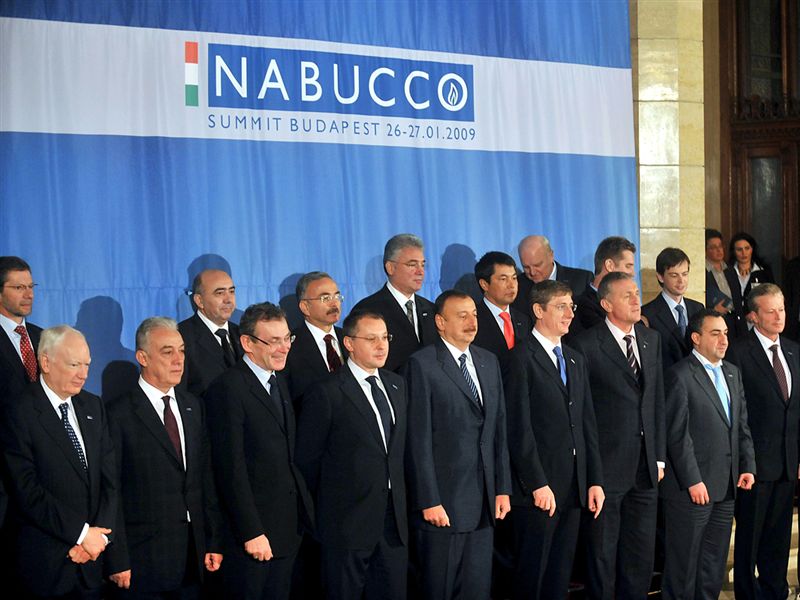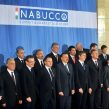
Turkey’s Stalling on Nabucco Hurts Europe, Azerbaijan, and Itself: Part One
Publication: Eurasia Daily Monitor Volume: 6 Issue: 42
By:

During the recent Nabucco summit in Budapest on January 26 and 27 (see EDM, January 29, 30), EU Energy Commissioner Andris Piebalgs underscored the importance of signing the intergovernmental agreement on the Nabucco project by the time of the European Union’s summit, to be hosted by the EU’s Czech presidency in Prague on May 7. For now, however, Turkey’s AKP government is continuing to stall on this project for transporting Caspian gas to Europe, a top priority of the EU. Without the intergovernmental agreement signed, Caspian natural gas producers will not be convinced to negotiate supply agreements with the Nabucco pipeline consortium, nor will investors be convinced to fund the project soon. Moreover, Ankara’s delaying tactics impede Azerbaijan’s direct access to European gas markets through the Nabucco project. Without an assured outlet to the West, gas field development and production in Azerbaijan is experiencing delays; and Russia’s Gazprom is stepping in with offers to absorb Azerbaijan’s existing and future export volumes. Ankara’s motivations for stalling on Nabucco are threefold: maximizing its own economic advantages at its partners’ expense, building diplomatic leverage with regard to the European Union, and advancing the AKP government’s strategic partnership with Russia.
With regard to the economic terms, Ankara demands a preemptive right to buy 15 percent of the Azerbaijani gas that would pass through the Nabucco pipeline en route to Europe during the project’s first phase. Moreover, Ankara insists on paying less than European netback prices for that lift-off portion (Ankara has not specified the 15 percent figure in the most recent talks). Turkey could then store that lift-off portion and either use it internally or re-export it to third countries at a profit. Additionally, Ankara seeks (in net terms) higher taxes and transit fees for the Turkish section of the Nabucco pipeline, less favorable to the project than the taxes and transit fees in the other consortium member countries.
Such arrangements could only work at the expense of Azerbaijan and the Nabucco pipeline consortium. The special advantages that Ankara demands would cut into Azerbaijan’s and the consortium’s future profit margins, raise otherwise unnecessary questions about investment returns, and delay funding of the project.
With no gas production of its own but with potentially brilliant prospects as a transit country, Turkey has suddenly developed the ambition to become a gas-selling country, albeit at the expense of its Azerbaijani and transit partners, risking jeopardizing that partnership even before it materializes.
The issue of arbitration and settlement of disputes in the future, once the project becomes operational, is an altogether different issue. Here the consortium partners and the EU Commission could find ways to accommodate Turkish concerns.
While the EU seeks to kick-start Nabucco as a top policy priority (with a growing sense of urgency after the long delays), Turkey’s AKP government perceives this situation as an opportunity to exert leverage over the EU. Indeed, Ankara perceives its own leverage as growing in direct proportion to the EU’s visible sense of urgency about the Nabucco project. During his recent visit to Brussels, Turkish Prime Minister Recep Tayyip Erdogan implied that Turkish support for Nabucco would be conditional on the EU accelerating the negotiations toward Turkish membership in the EU. He even implied a possible linkage between Turkish support for Nabucco and the EU’s position on Turkey’s disputes with Cyprus.
The AKP government has come to regard the Nabucco project as a trump card in its uneasy relationship with the EU. Turkish government leaders believe that the country’s geography—the sole land bridge from the Middle East and Caspian basin to Europe—gives Turkey unique influence on the energy-dependent EU.
It has become almost common place for AKP government leaders to assert that energy transit to Europe via Turkey is not only an economic project but also a Turkish geopolitical project that strengthens Turkey’s hand strategically vis-à-vis Europe. Even Energy and Natural Resources Minister Hilmi Guler seems to share the AKP political leaders’ thinking along these lines: "Turkey is undertaking the role of a bridge between East and West. Turkey is developing its geopolitical power with the current [energy transport] projects. We have the Nabucco gas transit project to Europe. This will increase Turkey’s importance" (Anatolia News Agency, February 21).
In Brussels, supporters and opponents of Ankara’s integration with the EU are bound to feel equally irritated by Ankara’s use of the "energy trump card." Opponents, mostly in Western Europe, are growing more resentful over Ankara’s delusion that it can pressure the EU. Supporters, mostly in Central and Eastern Europe, are growing frustrated with Ankara’s stalling on the Nabucco project, which this group of countries particularly values. In sum, any misuse of Turkey’s energy transit role by the AKP government for political leverage on the European Union would diminish Turkey’s value to the EU. Overplaying Ankara’s hand could, moreover, cast doubt on Turkey’s reliability as a transit country from a business perspective, quite apart from EU debates and European politics.




